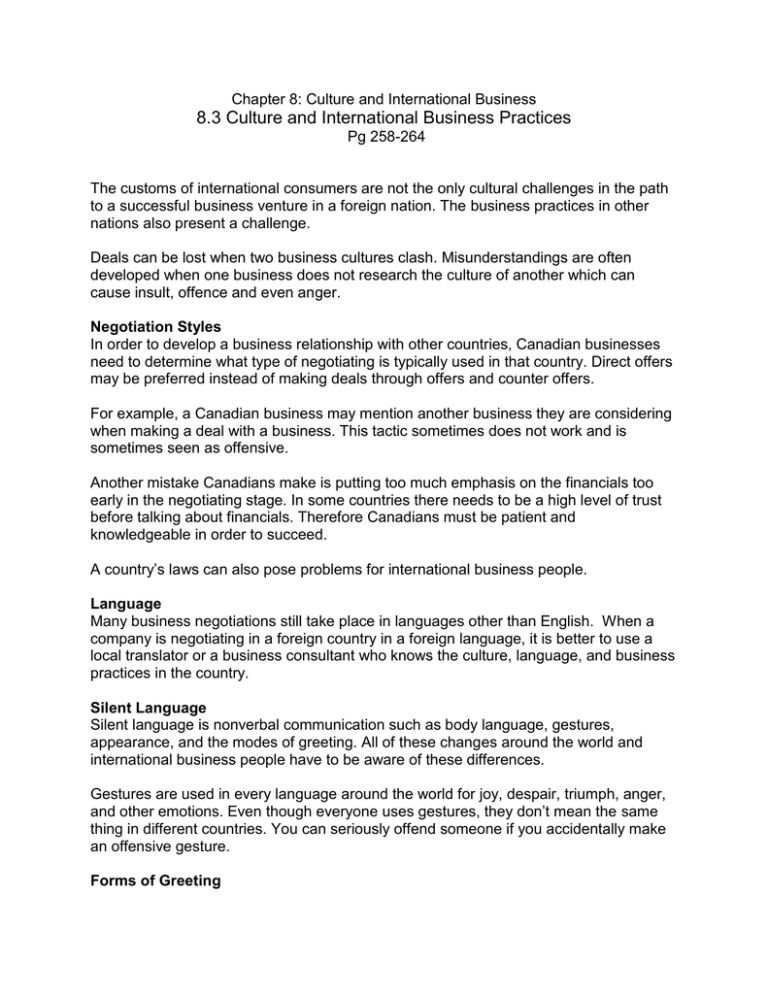8.3 Culture and International Business Practices
advertisement

Chapter 8: Culture and International Business 8.3 Culture and International Business Practices Pg 258-264 The customs of international consumers are not the only cultural challenges in the path to a successful business venture in a foreign nation. The business practices in other nations also present a challenge. Deals can be lost when two business cultures clash. Misunderstandings are often developed when one business does not research the culture of another which can cause insult, offence and even anger. Negotiation Styles In order to develop a business relationship with other countries, Canadian businesses need to determine what type of negotiating is typically used in that country. Direct offers may be preferred instead of making deals through offers and counter offers. For example, a Canadian business may mention another business they are considering when making a deal with a business. This tactic sometimes does not work and is sometimes seen as offensive. Another mistake Canadians make is putting too much emphasis on the financials too early in the negotiating stage. In some countries there needs to be a high level of trust before talking about financials. Therefore Canadians must be patient and knowledgeable in order to succeed. A country’s laws can also pose problems for international business people. Language Many business negotiations still take place in languages other than English. When a company is negotiating in a foreign country in a foreign language, it is better to use a local translator or a business consultant who knows the culture, language, and business practices in the country. Silent Language Silent language is nonverbal communication such as body language, gestures, appearance, and the modes of greeting. All of these changes around the world and international business people have to be aware of these differences. Gestures are used in every language around the world for joy, despair, triumph, anger, and other emotions. Even though everyone uses gestures, they don’t mean the same thing in different countries. You can seriously offend someone if you accidentally make an offensive gesture. Forms of Greeting Forms of greeting are also very important in international business. Again, you must do research or receive help in learning international greetings instead of accidentally offending someone with the wrong form of greeting. Also, you should always have a business card in the foreign language you are dealing with. Style of Dress Different cultures expect different things for suitable business attire. Dark suits are considered formal while khaki pants and open collared shirts are considered casual. In some countries a man can be dressed casually while a woman should remain formally dressed. If you’re traveling on business you should bring both casual and formal attire because it is better to be dressed too formally than too casually. Business Protocol Business protocol is the rules of correct or appropriate behavior to follow when meeting with officials or business people in another nation. Some considerations for a correct protocol are: gift giving, punctuality, scheduling meetings, and business entertaining. Gift Giving When visiting a foreign country on business the subject of gift giving should always be considered. Some countries expect gifts and some do not except gifts nor would they accept them. In Japan a gift is required especially for a first meeting whereas in Europe a gift at a meeting could be seen as a bribe and possibly illegal depending on the purpose of the meeting. You also want to make sure that you do not spend too much on a gift, because it is seen as a bribe or too little on a gift as it is seen as an insult. Punctuality Depending on the cultural background punctuality at business meetings can be an issue. For example in Germany if you showed up for a 3:00 meeting at 3:10 they would be offended but in Brazil they people you are meeting with for a 3:00 meeting may not arrive until 4:00. People from different culture have different views on time and punctuality. Scheduling of Meetings When scheduling meetings in a foreign country you must be aware of their national and religious holidays. Also depending on the country business hours may be different from place to place. In some countries business is shut down for the month of August for a summer break. Muslim businesses allow for 2 prayer breaks a day whereby no meetings are scheduled. Business Entertaining Business entertaining can be done through many different ways. Through lunches, dinners, or parties to negotiate with clients, suppliers or potential business partners. Entertaining is important to discussing problems, upcoming events or just simply to create a social relationship. Employee Management Although the business negotiations and everything has been completed successfully, the culture rules of different countries are still essential to learn. Having a sense of different cultured business practices is necessary for the management of foreign work. It is extremely important for the manager of foreign branch plant or retail outlets to understand the culture of his or her employees. For example in Canada most of us on a regular workday have an hour lunch break but in other parts of the world such as Europe most of their business has a 2 hour or more for a lunch break. Labor laws are often very protective of the country’s citizens. In many countries it is difficult to fire and employee for any reason. It is recommended that you review labor laws in different countries and hire a labor lawyer for labour negotiations. It is know that one of the most difficult problems when establishing a business in a foreign plant is the work ethics of other people. Different countries have different attitudes towards time/ punctuality. In communist countries the employee was rarely promoted and not rewarded for hard work. In result of this the motivation of employees was extremely low. In order to keep workers motivated promote them with higher income promotions and give them something to look forward to and encourage productivity.



